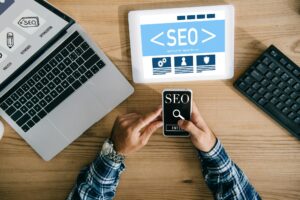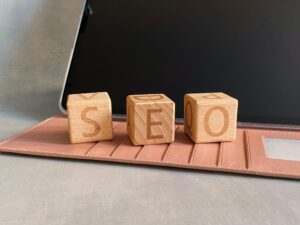Using ai for seo | artificial intelligence search engine optimization (2024)
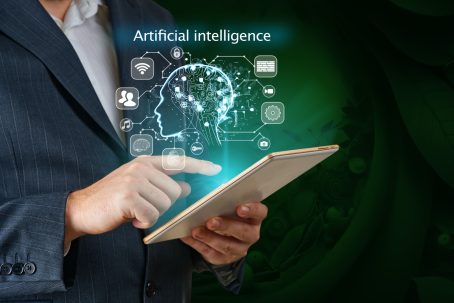
Category:SEO
Publish Date: 2023-11-30 21:45:12
In the ever-evolving landscape of digital marketing, a revolutionary alliance has taken center stage, reshaping the very foundations of online visibility and engagement. This groundbreaking partnership between artificial intelligence (AI) and Search Engine Optimization (SEO) and using artificial intelligence for SEO is not just a trend; it is a seismic shift that demands attention and strategic integration. As businesses navigate the intricate terrains of the online landscape, the imperative of comprehending the profound impact of fusing AI with SEO strategies and using AI for SEO becomes increasingly evident. This integration of artificial intelligence search engine optimization is not a mere choice; it is a necessity for those aspiring not just to survive but to thrive in the fiercely competitive digital sphere.
Should you desire, you can utilize the specialized seo services provided by the Ramikarem team. For further details, refer to SEO company in Vancouver.



 We suggest you also refer to on page optimization Vancouver.
We suggest you also refer to on page optimization Vancouver.

Understanding AI in SEO
To grasp the transformative force behind this alliance, one must delve into the very essence of AI within the realm of SEO with using artificial intelligence for seo. AI, in this context, transcends traditional optimization methodologies, encompassing the application of advanced algorithms and machine learning models. The archaic era of static keyword optimization is now a relic of the past. AI introduces a dynamic, adaptive approach that mirrors the perpetual evolution of search engine algorithms. It’s not just about deciphering keywords; it’s about understanding user intent, predicting trends, and adapting strategies in real time. This dynamicity is the cornerstone of AI’s impact on SEO, breathing life into once rigid and static optimization processes. To acquaint yourself with the basics of SEO, we recommend reading how to seo website step by step.Benefits of Using AI for SEO
As businesses embark on this journey into the future, the rewards of embracing AI for SEO are nothing short of transformative. The symbiosis between these two technological powerhouses opens the floodgates to a myriad of advantages. Improved search rankings and enhanced user experiences are not merely promises but tangible outcomes. The marriage of “Using artificial intelligence for SEO” goes beyond the surface; it’s a strategic imperative for those with an eye on sustained online visibility and relevance. AI-infused SEO transcends the limitations of traditional approaches. It’s not just about ranking higher; it’s about understanding and adapting to user behavior, providing personalized experiences, and staying ahead of the curve in a digital landscape characterized by perpetual flux. The benefits extend to the very core of digital strategies, influencing everything from content creation to user engagement and conversion rates. This synergy amplifies the efficacy of SEO efforts, ensuring that businesses are not merely adapting to change but driving it. The ability of AI to process vast amounts of data, recognize patterns, and make real-time adjustments make it great in using artificial intelligence for SEO and empowers businesses to navigate the intricate web of online competition with finesse. It’s not just about being seen; it’s about being seen by the right audience at the right time. AI is the compass guiding businesses through this complex navigation. If you are looking for SEO services, we suggest you visit North Vancouver search engine optimization.
AI Tools for SEO
In the dynamic landscape of digital marketing, the integration of AI into SEO in context of using artificial intelligence for seo, is akin to arming oneself with a sophisticated arsenal designed for precision and impact. The multifaceted nature of AI tools for SEO is emblematic of the depth and complexity of the digital realm. These tools, equipped with advanced capabilities, not only decode the intricacies of user behavior but also decipher the ever-evolving algorithms governing search engines.SEMrush
SEMrush stands as a beacon in the sea of digital tools, seamlessly integrating AI for competitive analysis and keyword research. Beyond the conventional realms of data analysis, SEMrush leverages AI to unveil insights that transcend the surface, providing marketers with a deeper understanding of their competitive landscape. By harnessing the power of AI, SEMrush transforms raw data into actionable intelligence, facilitating strategic decision-making that goes beyond traditional keyword optimization. If you are looking for an SEO expert, we suggest you visit SEO Expert Vancouver.Google’s RankBrain
At the heart of Google’s search algorithm evolution lies RankBrain, a machine learning marvel that epitomizes the intersection of AI and SEO. This algorithmic powerhouse enhances search results by deciphering user behavior patterns. RankBrain learns and adapts, fine-tuning search outcomes based on the evolving preferences and search habits of users. Its ability to dynamically adjust to user queries ensures that search results remain relevant in the face of the ever-changing digital landscape.MarketMuse
In the realm of content optimization, MarketMuse emerges as a beacon, utilizing AI to craft content that resonates with search intent. Beyond traditional keyword optimization, MarketMuse delves into the semantic intricacies of user queries, ensuring that content aligns seamlessly with what users seek. By leveraging AI in using AI for seo, MarketMuse empowers content creators to transcend the limitations of static keyword strategies, delivering content that not only attracts search engines but captivates human audiences. Reading how to rank on google first page in 2024 will likely prove beneficial for you.Overcoming Challenges with AI in SEO
The integration of AI into SEO heralds a new era of possibilities, but it is not without its challenges. As businesses embrace the transformative power of AI, they must navigate a digital frontier fraught with hurdles and complexities. Overcoming these challenges demands not just technical acumen but a strategic mindset and a commitment to ethical practices. Ensuring Ethical Use: One of the foremost challenges in the AI-SEO landscape in using artificial intelligence for seo, is the ethical use of these advanced technologies. The power to analyze vast amounts of data and predict user behavior comes with a responsibility to use this information ethically. Balancing the pursuit of optimization with user privacy and ethical considerations is a delicate dance that businesses must master to maintain trust and credibility. Interpreting Complex Algorithms: The algorithms that power AI in SEO are intricate, evolving entities. Interpreting these complex algorithms requires a deep understanding of not only the technical aspects but also the strategic implications. SEO professionals must become adept at deciphering the digital enigma, translating complex algorithms into actionable insights that drive meaningful optimization strategies. Addressing the Learning Curve: The integration of AI introduces a learning curve, demanding that SEO professionals and businesses commit to continuous growth. Staying abreast of AI advancements, understanding the evolving nature of algorithms, and upskilling teams are essential components of overcoming the learning curve. The commitment to ongoing education becomes a strategic imperative in the pursuit of AI-driven SEO excellence. We suggest you also refer to SEO in Abbotsford.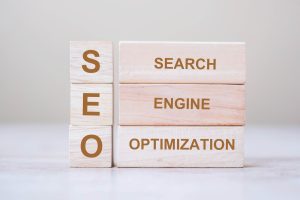
Future Trends in AI and SEO
The intersection of AI and SEO is not a static juncture but rather a dynamic crossroads, continually evolving as technology propels us into uncharted territories. As we peer into the future, the promise of innovative applications at this intersection becomes increasingly tantalizing, reshaping the landscape of digital marketing. The future of AI-driven SEO and using artificial intelligence for seo, heralds a paradigm shift toward personalized search experiences. AI algorithms, armed with user behavior data and advanced analytics, are poised to tailor search results with unprecedented precision. The era of generic search outcomes is waning, making way for a more personalized digital journey that aligns seamlessly with individual preferences and intents. Businesses that embrace and integrate personalized search experiences into their strategies are set to forge deeper connections with their audiences. As voice-activated devices become omnipresent, the significance of voice search optimization is on the rise. AI-driven SEO or using AI for seo, is at the forefront of this evolution, adapting to the nuances of conversational queries. The future envisions SEO strategies finely tuned to accommodate voice search, where understanding natural language and context becomes paramount. Businesses that proactively optimize for voice search are poised to capture a growing segment of the digital audience who prefer hands-free, spoken interactions. The integration of predictive analytics into AI-driven SEO marks a significant leap forward. Predictive analytics leverages machine learning to forecast user behavior, enabling businesses to anticipate needs and preferences. This foresight empowers SEO strategies to not just react to current trends but to proactively position content and offerings to meet the evolving expectations of the audience. The future of AI in SEO is predictive, allowing businesses to stay ahead of the curve by understanding and fulfilling user needs before they even arise. We suggest you also refer to technical seo services vancouver. [elementor-template id=”19523″]Case Studies
Real-world applications of “using AI for SEO” transcend theoretical possibilities, finding tangible expression in the success stories of leading businesses. These case studies serve as beacons, shedding light on the transformative impact of the symbiotic relationship between AI and SEO.Increased Organic Traffic
Examining cases where AI has been seamlessly integrated into SEO strategies reveals a consistent trend of increased organic traffic. The adaptability and precision of AI-driven algorithms contribute to elevated search rankings and visibility, translating into a quantifiable surge in organic traffic. Businesses that strategically leverage AI witness not just incremental but substantial growth in their online presence.Higher Conversion Rates
The marriage of AI and SEO is not merely about attracting visitors but converting them into customers. Case studies consistently highlight higher conversion rates as a direct result of AI-infused SEO strategies. The ability of AI to understand and cater to user intent ensures that the traffic attracted is not just voluminous but also qualitatively aligned with the products or services offered, leading to enhanced conversion rates.Improved ROI and Maximizing Digital Investments
Perhaps one of the most compelling aspects of these case studies is the demonstrated improvement in Return on Investment (ROI). Businesses that embrace AI-driven SEO witness a more efficient allocation of resources, translating into a maximized ROI. The adaptability of AI ensures that strategies are not static but dynamic, continuously optimizing and refining based on real-time data and user behavior. These case studies serve as living proof that using artificial intelligence for SEO is not a speculative venture but a strategic necessity for those aiming at tangible, measurable success in the digital landscape. We suggest you also refer to local search vancouver.AI vs. Traditional SEO
Contrasting AI-driven SEO in using artificial intelligence for SEO with traditional approaches unveils the seismic shift that is reshaping the industry. While traditional SEO relies on static strategies and predefined keyword optimization, AI introduces adaptability and responsiveness, providing a competitive edge in the dynamic digital landscape.- Adaptability in the Face of Change
- Responsiveness to User Intent
- Competitive Edge in the Digital Landscape

The Role of Machine Learning in SEO
Machine learning, nestled within the broader domain of AI, stands as a dynamic force shaping the future trajectory of SEO. Its influence extends beyond static algorithms, offering a dynamic and adaptive approach that continually refines and optimizes SEO strategies. Predicting User Behavior: Machine learning algorithms, fueled by vast datasets and user interactions, excel at predicting user behavior. This predictive capability empowers SEO strategies to not only react to current trends but to anticipate the evolving needs and preferences of users. As machine learning refines its understanding of user intent, SEO becomes a proactive force in aligning content and strategies with the ever-changing expectations of the digital audience. Automating Content Optimization: In Concept of using artificial intelligence for seo, ne of the cornerstones of machine learning in this field of digital marketing is its ability to automate content optimization. Rather than relying on manual adjustments, machine learning algorithms analyze performance data, user engagement metrics, and evolving search algorithms to refine content strategies autonomously. This automation not only enhances efficiency but also ensures that content remains relevant and resonant in the face of constant digital evolution. Creating a Dynamic and Responsive Online Presence: The true essence of machine learning lies in its dynamic nature. Unlike static approaches, machine learning algorithms evolve with the digital landscape, learning from user interactions and adapting strategies in real time. This dynamism ensures that the online presence of businesses remains not only relevant but actively responsive to the nuanced shifts in user behavior and search engine algorithms. For understanding the principles and techniques of internal SEO, refer to how to do on page optimization.Ethical Considerations in AI-Driven SEO
As AI takes the spotlight in SEO, ethical considerations become a lodestar guiding businesses through the dynamic and sometimes treacherous landscape of digital dominance. Balancing the pursuit of visibility with responsible and transparent practices becomes not just a choice but a crucial aspect of maintaining credibility and trust. The collection and utilization of user data in using artificial intelligence for seo, raise ethical considerations. Businesses must prioritize user privacy, ensuring that data is handled responsibly and transparently. Establishing robust data protection measures not only aligns with ethical standards but also safeguards the trust users place in the digital ecosystem. Ethical AI-driven SEO necessitates the avoidance of biased algorithms that could perpetuate discrimination or unfair practices. Businesses must actively address and rectify biases in algorithms, fostering inclusivity and fairness in search results. Transparent communication about algorithmic decisions is essential for building and maintaining trust with users. Maintaining ethical standards requires transparent communication. Businesses engaging in using AI for SEO must communicate openly about the use of AI, the purpose of data collection, and the impact on user experience. Transparent practices foster trust, creating a positive user perception and mitigating potential concerns about privacy and data usage. We suggest you also refer to on page optimization Vancouver.
We suggest you also refer to on page optimization Vancouver.
Preparing for AI-Driven SEO
The transition to AI-driven SEO is not a passive evolution but a deliberate and strategic shift. Businesses must prepare comprehensively, involving:- Upskilling Teams: upskilling teams to harness the potential of advanced technologies.
- Investing in the Right Technology: Businesses must invest in cutting-edge tools and platforms that align with their strategic objectives.
- Fostering a Culture of Continuous Learning: This involves not only formal training programs but also encouraging a mindset of experimentation and innovation, allowing teams to contribute to the optimization of AI-driven strategies actively.
Common Misconceptions about AI in SEO
In the midst of the transformative power of AI in SEO, dispelling myths and misconceptions is essential for informed decision-making.so in using artificial intelligence for seo, addressing these misconceptions fosters a nuanced understanding of the collaborative role that AI plays in optimizing SEO strategies.AI Replacing Human Input Entirely
One common misconception is the notion that AI replaces human input entirely. In reality, AI in SEO is most effective when working in collaboration with human expertise. While AI brings automation and efficiency, human insights, creativity, and strategic thinking remain irreplaceable components of a successful SEO strategy.Complexity Deterring Adoption
The perceived complexity of AI can be a deterrent to adoption. Businesses should understand that using artificial intelligence for SEO doesn’t require an immediate, all-encompassing shift. Rather, it can be a gradual process, with businesses starting with specific use cases and progressively expanding as their understanding and capabilities grow.AI as a Fix-All Solution
AI is a powerful tool, but it is not a panacea. Expecting AI to be a fix-all solution without a strategic implementation plan can lead to disappointment. Businesses must approach AI with a clear understanding of its capabilities, aligning its use with specific goals and objectives.
Tips for Implementing AI in Your SEO Strategy
Embarking on the AI journey requires more than enthusiasm; it demands a strategic blueprint. Implementing AI in SEO strategies and using artificial intelligence for SEO involves aligning technology with business goals, staying adaptable, and fostering a culture of experimentation.- Aligning Technology with Business Goals
- Staying Adaptable
- Fostering a Culture of Experimentation
Measuring Success in AI-Enhanced SEO
Quantifying success in artificial intelligence search engine optimization involves more than tracking traditional metrics. A comprehensive approach encompassing organic traffic growth, improved search rankings, and user engagement provides valuable insights into the efficacy of AI-driven strategies.Organic Traffic Growth
While numerical growth in organic traffic is a key metric, the quality of that traffic is equally important. Using artificial intelligence for SEO should not only attract more visitors but ensure that they align with the target audience and exhibit genuine interest in the content or offerings.Improved Search Rankings
Enhanced search rankings are a tangible outcome of effective AI-driven strategies. Monitoring improvements in rankings across relevant keywords provides a clear indication of the impact of AI on the visibility of a business in search engine results.User Engagement
User engagement metrics, such as time spent on site, bounce rates, and interactions, offer insights into the resonance of content and the overall user experience. The effectiveness of using AI for SEO should be reflected not only in attracting users but also in keeping them engaged and fostering meaningful interactions. [elementor-template id=”19628″]Conclusion
In the fast-paced and ever-evolving world of digital marketing, the marriage of AI and SEO or using artificial intelligence for SEO is more than a trend, it is a paradigm shift. “Artificial intelligence search engine optimization” is not a distant aspiration; it is a current reality reshaping how businesses approach online visibility and engagement. As businesses navigate this transformative journey, the cornerstones of SEO excellence in the age of AI become clear. Staying informed about technological advancements, embracing innovation, adapting to the evolving landscape, and balancing the pursuit of digital dominance with ethical and responsible practices are the guiding principles. The future of SEO is not static but dynamic, propelled by the collaborative power of human ingenuity and AI-driven innovation. As businesses align their strategies with these principles, they are not merely adapting to change but actively shaping the future of SEO in the age of AI.Recent Articles:
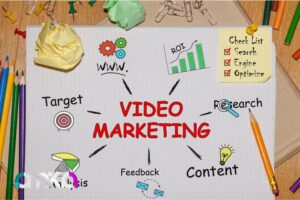
Video Marketing Canada: Best Strategies for 2025
2 months ago
5 min 25 sec read

Photography Services Canada: For Web & Social Media Use
2 months ago
5 min 2 sec read

Logo Design Canada: Create a Logo That Truly Stands Out
3 months ago
4 min 38 sec read
Let us help !
Related Posts
Comments
0
0
votes
Article Rating
Subscribe
Login
0 Comments
Oldest
Newest
Most Voted
Inline Feedbacks
View all comments


